Understanding Enabling Behaviors
Enabling behaviors in addiction recovery can hinder progress by shielding individuals from the natural consequences of their actions. These behaviors, often born from the best of intentions, can unintentionally support ongoing substance use, complicating the journey to recovery. It’s crucial to identify, understand, and alter these enabling actions to facilitate a healthier recovery environment. This article explores how to recognize enablers, set boundaries, and offer support without fostering dependency.
Spotting Enabling Behaviors
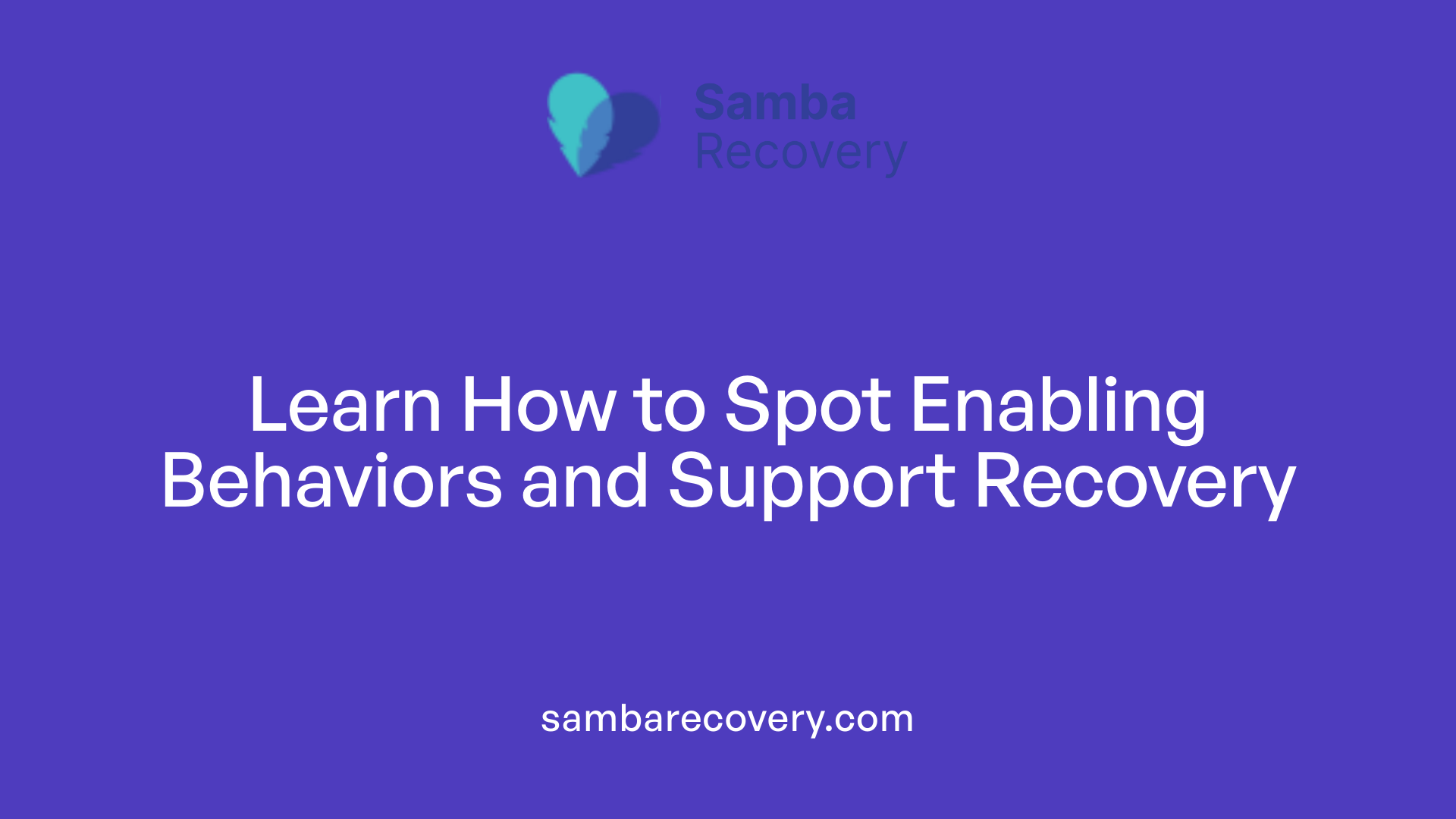
How do you identify enabling behaviors in addiction recovery?
Enabling behaviors in addiction recovery are actions that unintentionally support or maintain a loved one’s substance use by shielding them from the natural consequences of their actions. These behaviors can include making excuses for their behavior, paying bills or providing financial support that facilitates drug or alcohol use, covering up negative actions, bailing them out of jail, or taking over responsibilities they should handle themselves.
Recognizing these actions involves paying close attention to certain signs. For example, if you find yourself neglecting your own well-being, feeling overwhelmed or helpless, or becoming isolated from friends and family, these may be indicators of enabling. Additionally, constantly justifying or excusing the loved one’s behavior—such as rationalizing drunkenness or dishonesty—can also point to enabling.
Much of enabling stems from good intentions; people often want to help, but unintentionally, their actions can prevent the person from facing the full consequences of their choices. This hinders their motivation to seek help or change.
To identify enabling, reflect on whether your actions are supporting continued addiction rather than encouraging accountability or recovery. If your support feels more like aiding in avoiding problems rather than confronting and managing them, you might be engaging in enabling behaviors.
Understanding and recognizing these behaviors is crucial for making healthy changes that promote the loved one’s growth and recovery, rather than prolonging their dependence on substances.
Traits of the Enabler
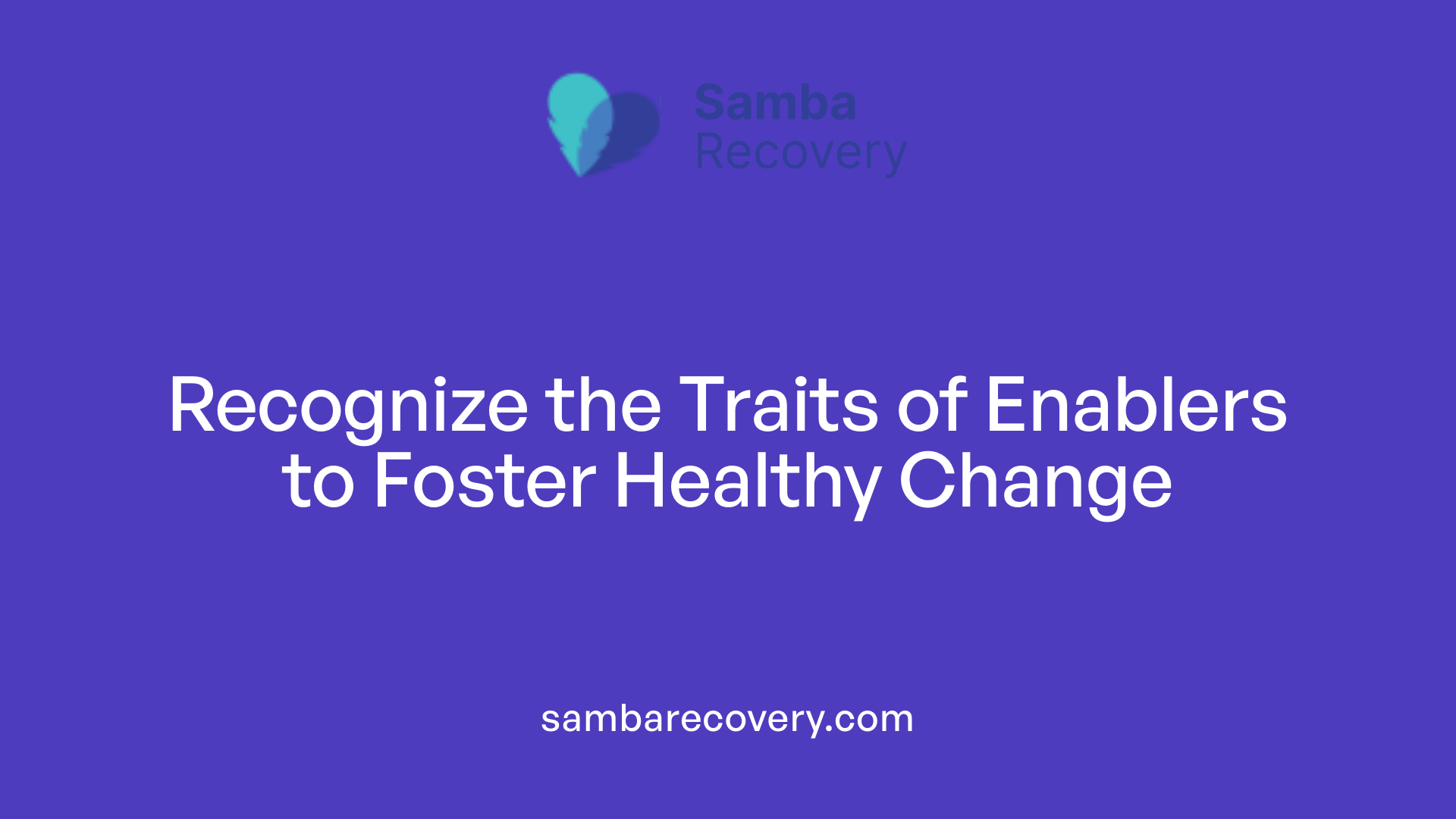
What are the signs and traits of an enabler in addiction recovery?
Enablers often display certain behaviors and characteristics that unintentionally support and perpetuate an addict’s harmful habits. Frequently, they avoid conflicts by denying or minimizing the severity of the addiction, which prevents the individual from recognizing the need for help.
A common trait is the tendency to cover up or justify problematic behaviors of the addicted person. This may include making excuses for their actions, denying there is a problem, or helping them avoid consequences. For instance, enablers might pay bills or provide transportation to allow continued substance use without facing the repercussions.
Many enablers focus primarily on the needs of the substance user, often neglecting their own well-being. They may feel helpless, overwhelmed, or resentful of the ongoing situation. This can lead to emotional exhaustion, with some feeling trapped in a cycle of caretaking that they don’t fully understand.
Signs include consistently providing financial support, shelter, or transportation without addressing the underlying issues. Enablers often take responsibility for tasks that the addict should reasonably do themselves, like cleaning up after messes or managing responsibilities.
Feelings of guilt or guilt-driven behaviors are common, along with an inability to set firm boundaries. They may also experience frustration or resentment, but without recognizing their enabling role. Identifying these traits is vital for making positive changes.
Understanding their roles in addiction recovery
Enablers play a complex role in the cycle of addiction. Although their intentions stem from love and concern, their actions often delay the addict’s acknowledgment of the problem by shielding them from the full consequences.
By consistently rescuing or making excuses, enablers undermine the individual’s motivation to seek help and hit “rock bottom,” which is often necessary for recovery. This dynamic can foster codependency, where the enabler’s sense of worth is linked to caregiving or rescuing.
Breaking free from enabling behaviors involves recognizing these traits and behaviors, establishing healthy boundaries, and seeking professional support. Family therapy, support groups like Al-Anon, and educating oneself about addiction are essential steps for enablers to recover and foster a healthier environment for their loved ones.
Understanding the traits of enablers is critical for anyone supporting a loved one with addiction. Addressing these behaviors can significantly improve the family’s overall health and increase the chances of successful recovery for the addict.
Avoiding Enabling Actions
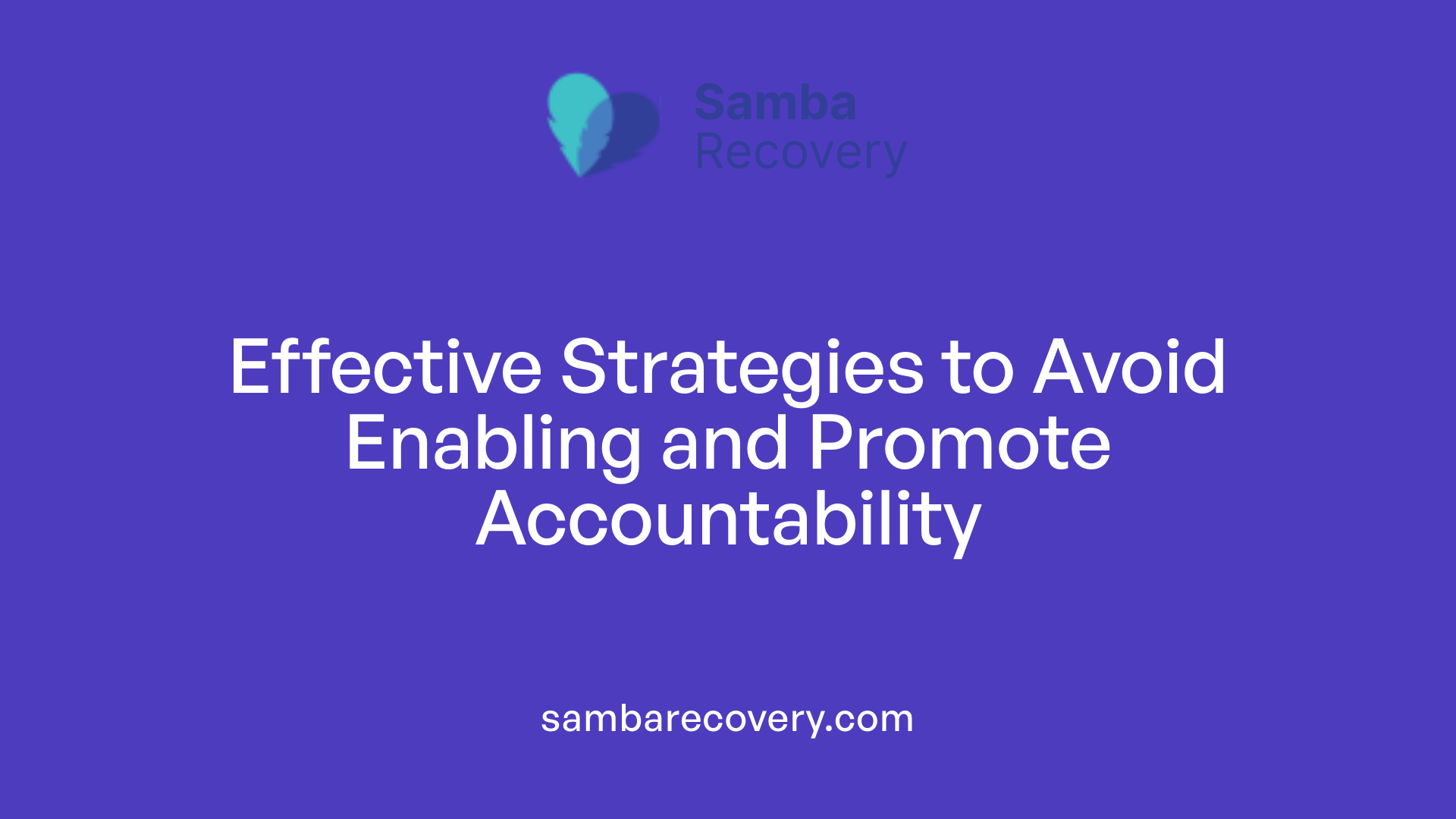
Strategies to avoid enabling
Preventing enabling behaviors requires intentional effort and clear strategies. First, establish and communicate firm boundaries that define what behaviors are acceptable and what are not. For example, avoid giving financial aid that could be used for substances or covering up harmful actions. Instead, focus on supporting healthy choices, such as encouraging professional treatment.
Second, allow your loved one to face natural consequences. Refrain from stepping in to fix problems caused by their actions, which fosters accountability. This can be challenging, but it is crucial for their motivation to seek help.
Third, seek professional help and join support groups such as Al-Anon or Nar-Anon. These resources provide education on addiction and enabling, as well as emotional support to maintain boundaries.
Lastly, practice consistent enforcement of boundaries. Be clear, assertive, and compassionate when communicating limits. Maintaining these boundaries over time helps safeguard your well-being and encourages healthier behavior in your loved one.
Establishing boundaries against enabling behaviors
Setting boundaries involves defining what is and isn’t acceptable in your relationship. Examples include refusing to pay for expenses that support harmful habits, not covering for their mistakes, and not shielding them from the consequences of their actions.
Communicate these limits calmly and assertively, explaining that your goal is to support their recovery while protecting your own health. Regularly reinforce boundaries and avoid guilt-tripping or making exceptions.
Moreover, prioritize self-care and emotional resilience. Engaging in therapy can help you navigate difficult conversations and strengthen your capacity to say no.
In summary, avoiding enabling involves consistent boundary-setting, encouraging accountability, utilizing professional and peer support, and focusing on your own well-being. These measures help create an environment conducive to recovery and healthier relationships.
The Impact of Enabling on Recovery
How does enabling impact addiction recovery?
Enabling behaviors can have a profound negative effect on the process of overcoming addiction. When loved ones or friends unintentionally support or reinforce harmful behaviors—such as paying bills for the addict, covering for them, or making excuses—this can prevent the individual from facing the full consequences of their actions. As a result, the motivated drive to seek help diminishes because the addict doesn’t experience the setbacks that might motivate change.
These behaviors often create an environment in which the addiction persists longer than necessary, making recovery more difficult. The individual may feel discouraged from taking responsibility or may not recognize the severity of their situation.
Conversely, when enabling is reduced or stopped entirely, it opens pathways to healthier recovery strategies. Setting firm boundaries, encouraging accountability, and promoting independence can help the person realize the need for professional treatment and personal change.
Recovery support services, such as peer mentorship, family therapy, and community programs, play crucial roles in fostering an environment of growth and resilience. These resources are designed to increase recovery capital—the internal and external resources that support sustained sobriety.
Ultimately, detaching with love—meaning to provide emotional support without enabling—empowers the individual to confront their issues directly. Promoting this autonomy helps them build resilience and motivates active participation in treatment, laying the groundwork for lasting recovery.
How does enabling delay engagement with recovery resources?
Enabling can delay the pursuit of necessary treatment and support options. When individuals are shielded from the natural consequences of their substance use by those around them, they may not feel the urgency to seek formal help.
This delay can lead to worsening health, stronger addiction patterns, and more complicated recovery processes. Early intervention is often critical for successful recovery, but enabling behaviors can prolong denial and resistance to change.
Recognizing and altering enabling patterns is essential to facilitate timely engagement with recovery resources. Addressing these behaviors ensures that individuals face reality, accept help, and begin their journey toward sobriety.
Support from family, friends, and community services that emphasize setting boundaries and promoting personal responsibility is vital. Through these measures, opportunities for recovery are maximized, and the pathway to healing is shortened.
Setting Boundaries with Enablers
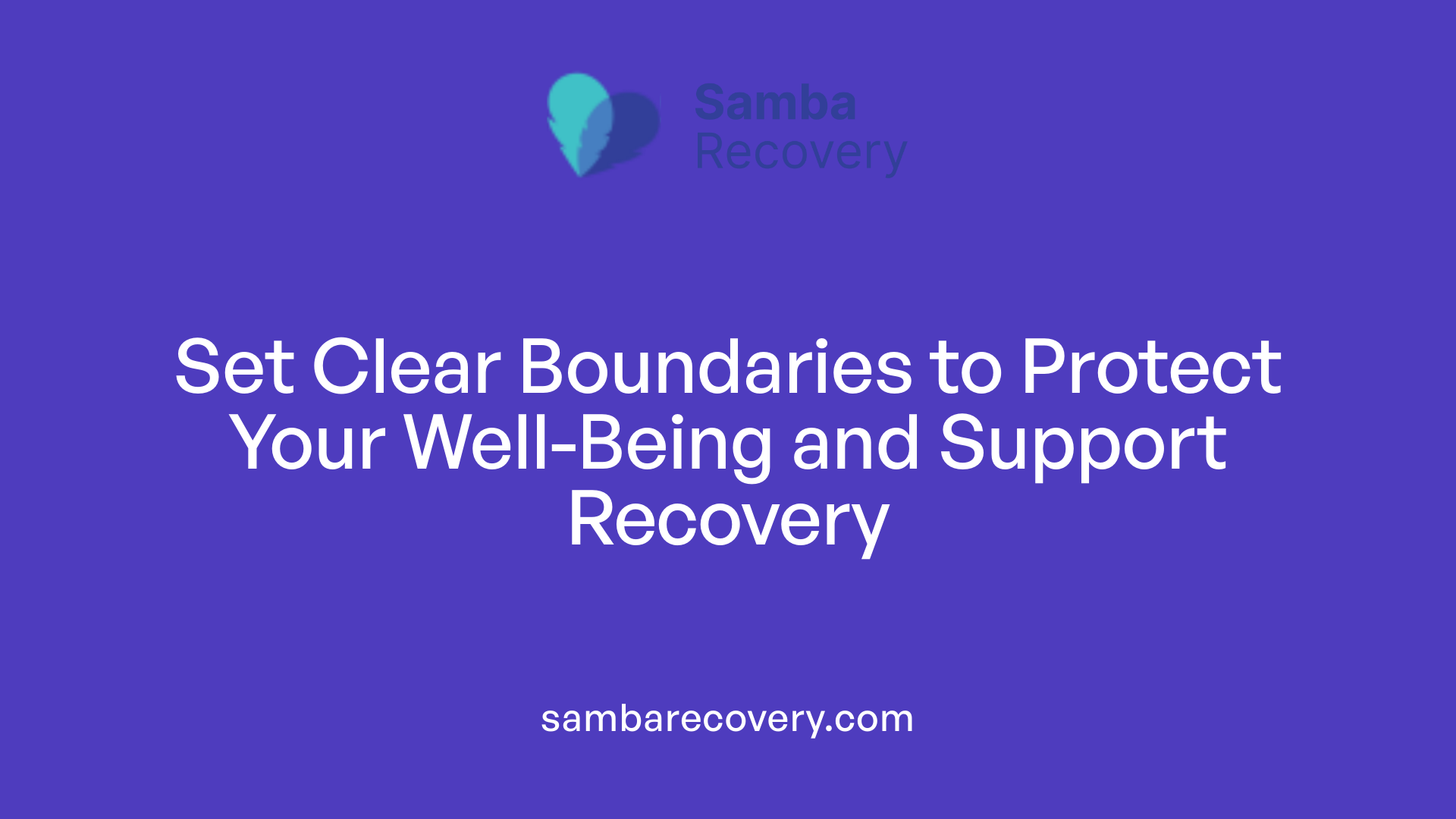
Managing relationships with enablers can be challenging but is crucial for supporting recovery and maintaining personal well-being. Recognizing enabling behaviors, such as making excuses, rescuing, or covering up harmful actions, is the first step. Once you identify these patterns, it becomes essential to establish clear and firm boundaries.
Effective boundary setting involves communicating what behaviors are acceptable and outlining consequences if those boundaries are crossed. Focus on controlling your responses and access rather than trying to change the enabler directly. For instance, you might decide not to lend money for substances or to avoid covering for them during crises.
Consistency is vital. Enforce your boundaries every time they are tested to reinforce your limits. Practice self-awareness by prioritizing your own needs and well-being, which helps prevent falling into patterns of enmeshment or resentment.
Techniques like detachment and tough love can significantly reduce emotional reactivity. Detachment means learning to respond thoughtfully rather than react impulsively to manipulative or enabler-driven behaviors. Tough love involves setting firm limits even if it causes initial discomfort or conflict, with the goal of helping the loved one face the consequences of their actions.
Seeking support from therapy, support groups such as Al-Anon, or consulting with professionals can provide additional strategies and emotional strength. These resources can reinforce your boundary-setting skills, ensure you stay the course, and protect your mental health.
Remember, establishing boundaries is a way of empowering yourself, protecting your health, and encouraging the loved one to take responsibility for their actions. It fosters a healthier relationship dynamic where recovery can be more attainable for the addicted individual.
Breaking the Cycle of Enabling
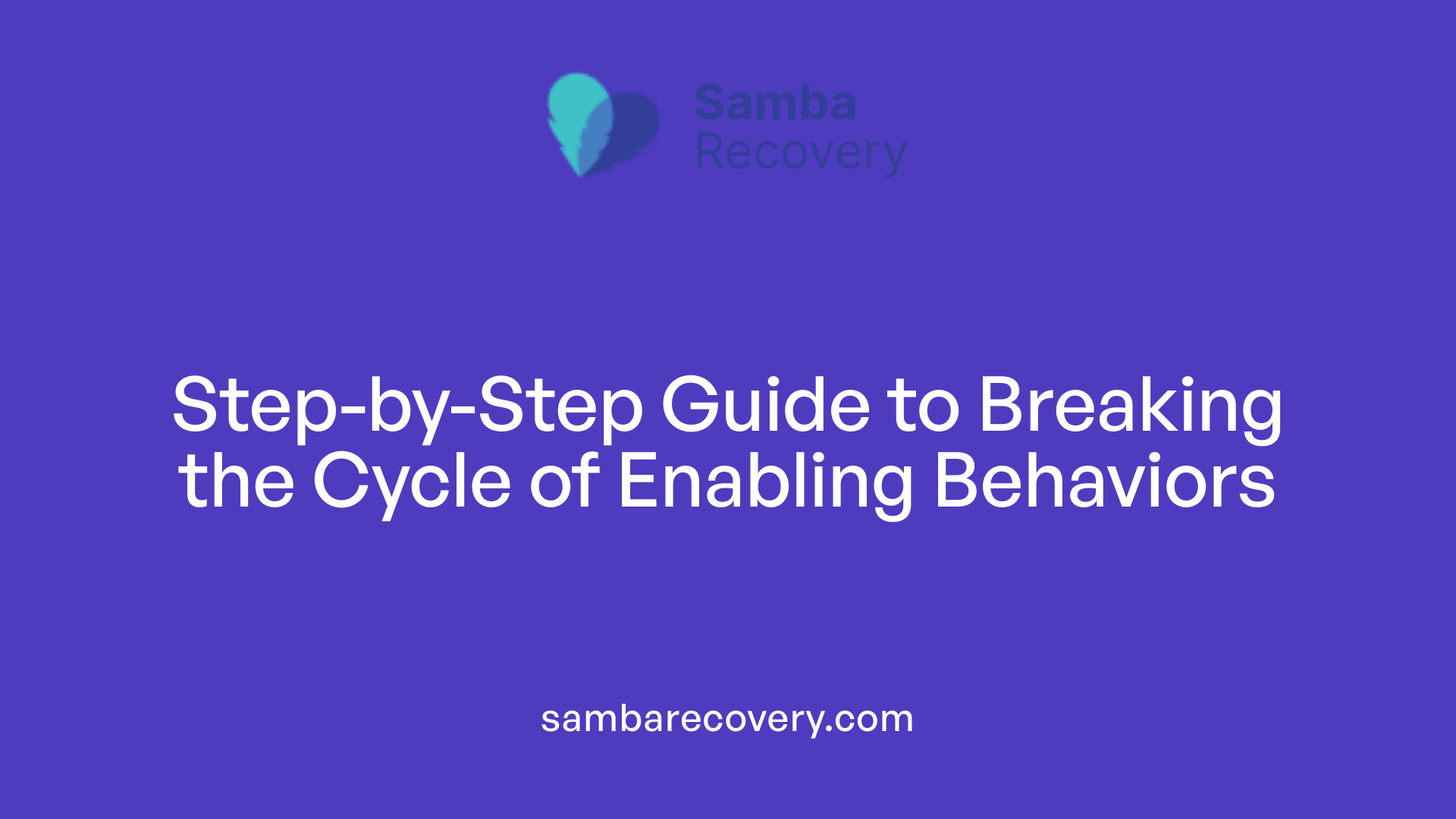
Steps to stop enabling actions
Breaking the habit of enabling requires a conscious effort to change behaviors that unintentionally support harmful or addictive actions. The first step is awareness; recognize behaviors like paying for expenses, covering up for irresponsible or risky conduct, or ignoring dangerous actions. Establishing firm boundaries is essential—this means refusing to supply resources such as money or transportation that could be used for substance use or illegal activities. It also involves not bailing the loved one out of legal or financial trouble, which can enable ongoing problematic behaviors.
Practicing consistency is vital. Once boundaries are set, it is important to stick to them, despite possible resistance or manipulation attempts by the loved one. Encouraging independence by allowing natural consequences to occur can motivate the individual to recognize the impact of their actions and seek help. Participating in support groups like Al-Anon offers emotional support and practical advice for those working on stopping enabling.
Finally, prioritize your own well-being through self-care, and remember that change is a gradual process. Patience and persistence are crucial for finally breaking the cycle of enabling.
How to foster accountability
Fostering accountability involves creating an environment where the individual understands that their actions have consequences. This can be achieved by clearly communicating expectations and boundaries. When boundaries are crossed, follow through with appropriate consequences, like reducing contact temporarily or withholding financial support.
Supporting accountability also means encouraging the person to seek professional help or join treatment programs. Family therapy sessions can be beneficial by addressing dysfunctional, enabling patterns and promoting healthier communication. Recognizing and rewarding responsible behaviors further reinforces accountability.
Self-awareness is important; acknowledge your own role in the relationship dynamic and avoid guilt or resentment. Empowering the individual to take responsibility for their choices fosters independence and can ultimately motivate them toward recovery.
How can someone break the cycle of enabling?
To break the cycle of enabling, it is essential to recognize and stop engaging in behaviors that support or excuse harmful actions, such as paying bills, covering for missed obligations, or making excuses for destructive behavior. Setting firm, clear boundaries—like refusing to give money, not bailing a loved one out of legal trouble, and not making excuses—is crucial for fostering accountability. Supporting autonomy and independence encourages the individual to face natural consequences, which can motivate change. Joining support groups like Al-Anon can provide guidance and emotional strength for those trying to stop enabling. Consistency, self-care, and understanding that change takes time are key to successfully ending enabling behaviors.
Support Without Enabling
Supporting someone through recovery from addiction requires a delicate balance between providing help and avoiding behaviors that inadvertently enable harmful patterns. Effective support begins with establishing clear boundaries. These boundaries serve to protect your well-being and ensure the loved one faces the natural consequences of their actions, which can motivate accountability and personal growth.
One of the most important methods is to focus on emotional support that encourages independence. Listening actively and offering encouragement can boost self-esteem and motivate the individual to seek help or continue their recovery journey. It’s equally critical to respect their autonomy—avoid controlling or rescuing behaviors—and instead promote responsible decision-making.
Encouraging accountability involves being honest about your limits and the consequences of enabling behaviors like financial support or covering up for destructive actions. Instead of paying their bills or making excuses, suggest professional treatment options and help connect them with resources such as therapy, rehab, or support groups.
Practicing empathy is vital—understanding their struggles without excusing harmful behaviors helps foster trust and openness. Practical guidance might include helping them find local treatment services online or accompanying them to appointments, but without taking over responsibilities that belong to the individual.
Creating a supportive environment means reinforcing the individual’s ability to handle challenges independently and fostering resilience. Celebrating small victories and emphasizing long-term responsibility help cultivate a mindset geared towards recovery.
In summary, effective support involves setting firm yet compassionate boundaries, promoting accountability, and offering encouragement that nurtures responsibility. Supporting recovery in this way helps the individual gain confidence and motivation, ultimately leading to healthier choices without fostering dependency or enabling destructive habits.
The Role of Family and Support Networks
Influence of family roles and dynamics on enabling
Family members often play complex roles in the context of addiction. Some family roles, such as the caretaker or hero, can inadvertently foster enabling behaviors, where love and concern lead to actions that support or prolong substance abuse. These roles might include making excuses for the loved one, covering up their actions, or providing financial resources that sustain their addiction.
Certain family dynamics, like co-dependency, can lead to unhealthy support systems where the loved ones prioritize the addict’s needs above their own, unintentionally supporting continued substance use. Recognizing these roles is crucial in addressing enabling behaviors and fostering healthier interactions.
Impact of support networks
Support networks, including family, friends, and recovery groups, can significantly influence addiction recovery. Positive support systems provide encouragement, understanding, and accountability, helping individuals stay committed to treatment.
However, if these networks contain enablers or individuals unaware of the addiction’s nature, they can hinder progress. For example, uneducated family members might unintentionally support harmful habits or resist necessary boundaries.
Support groups like Al-Anon or Nar-Anon offer valuable resources for families, helping them understand addiction, set boundaries, and avoid enabling. Clear communication, education, and professional guidance are essential for transforming support networks into pillars of recovery instead of supports for enabling behaviors.
Educational Tools and Resources
Understanding enabling behaviors is vital for families and friends supporting someone with addiction. Numerous educational resources are available to help individuals recognize and modify enabling actions that may inadvertently sustain harmful patterns. Books, online articles, and workshops offered by organizations like SAMHSA or addiction support groups provide comprehensive information about enabling and addiction recovery.
Learning about addiction is essential, as it clarifies that substance use is a treatable brain disorder. Educating oneself on the symptoms, causes, and effects of addiction helps in differentiating between helpful support and enabling behaviors. This knowledge empowers loved ones to set healthy boundaries, encourage treatment, and avoid actions that hinder recovery.
Resources for gaining insight include:
| Resource Type | Examples | Purpose |
|---|---|---|
| Books & Guides | "Codependent No More" by Melody Beattie | Offers insights into enabling and codependency |
| Online Courses | SAMHSA’s online educational modules | Provides structured learning about addiction and enabling |
| Support Groups | Al-Anon, Nar-Anon | Community-based support focusing on enabling and boundaries |
| Professional Consultation | Family therapy or individual counseling | Personalized guidance for recognizing enabling behaviors |
Using these tools, families can better understand their roles and develop strategies for supporting recovery without unintentionally enabling addictive behaviors. Professional help and ongoing education remain central to fostering healthier relationships and promoting lasting change.
Building Healthier Recovery Environments
Breaking free from enabling behaviors requires understanding, boundaries, and commitment. By intentionally redefining relationships and roles within the context of addiction recovery, individuals can effectively support their loved ones without compromising their well-being or progress. This involves an ongoing process of education, boundary-setting, and support system utilization to foster constructive change. For those entrenched in enabling cycles, seeking external guidance through professional resources or support groups can provide the necessary tools and encouragement to create sustainable paths to recovery.
References
- SAMHSA’s National Helpline | SAMHSA
- 10 Tips to Stop Enabling a Loved One’s Addiction
- How to Detach: Love An Addict Without Enabling
- What Is an Enabler? – Stop Enabling Today – Addiction Center
- Signs You’re Enabling a Loved One’s Addiction – WebMD
- Enabler: Definition, Behavior, Psychology, Recognizing One, More
- What is an Enabler? 5 Signs – Compassion Behavioral Health






